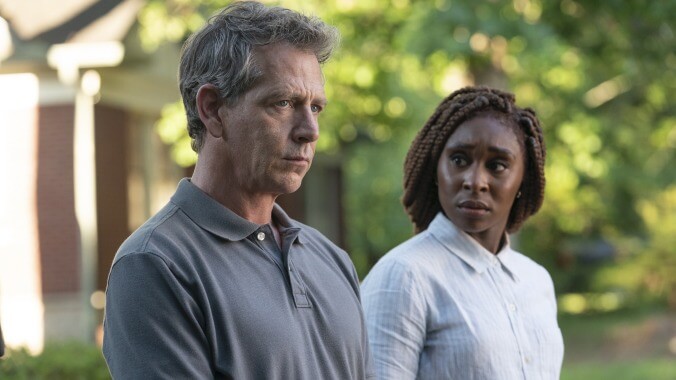Crime might seem an odd fit for an author known primarily for his ghouls, but follow King on Twitter and you’ll see him stump as much for hard-boiled yarns as he does horror. The Outsider could be read as a culmination of sorts for his own dalliance with the genre, which began with pleasantly pulpy tales like 2005’s The Colorado Kid and 2013’s Joyland. King put his own stamp on the style by sprinkling the supernatural into his Mr. Mercedes trilogy, and continued to do so with The Outsider, a sprawling, affecting tome that paired the author’s mythic brand of terror with the procedural minutiae of crime fiction. Still, since no pulp fanatic is turning to King for their crime fix, it was an inspired choice for HBO to let storied author Richard Price oversee this adaptation. An acclaimed crime novelist and Hollywood veteran, Price turned to TV as a writer on The Wire before helming 2016’s The Night Of, a series that shares ample DNA with The Outsider, from its unforgiving milieu and offbeat characterizations to its focus on the far-reaching consequences of a criminal case.
It’s an inspired match, but know that The Outsider’s first two episodes are, like The Night Of, unrelentingly grim. Not only are we confronted with the mangled corpse of a child in the opening minutes, but we’re almost instantly thrust into a community in free fall. Ralph, incensed by the brutality of the crime, chooses to have Terry, who claims to have no knowledge of the murder, publicly arrested at a little league game, his family and neighbors serving as witnesses. As Marcy Maitland (Julianne Nicholson) and her children are turned into local pariahs, the family of the murdered boy begins to self-destruct like a string of grenades. At the center of it all is Ralph, who, along with his long-suffering wife, Jeannie (Mare Winningham), is still mourning the recent loss of their own son to cancer (a change from the novel that casts an even darker pall on the proceedings).
Thankfully, Price and Bateman, the latter of whom helms the first two episodes, don’t revel in the misery, with Danny Bensi and Saunder Jurriaans’ skeletal, string-forward score serving to frame and compartmentalize the show’s fountains of grief. Their focus is on the peculiarities of the mystery and the procedural aspects of the investigation, which are unpacked with grace and clarity via interrogations and well-executed time jumps. Mendelsohn, too, is a steady centerpiece, confidently playing a flawed, emotionally broken lawman whose poker face perseveres even as his rage threatens to boil over. Fans of the genre will no doubt be enthralled, while others may long for a touch of levity.
The Outsider takes a turn in its third episode, however, with the introduction of Holly Gibney (Cynthia Erivo), a skilled, socially awkward P.I. who brings an eccentricity to the series that viewers will either welcome or reject. Holly has become a recurring presence in King’s later work—she was introduced in Mr. Mercedes; Justine Lupe plays her in David E. Kelley’s adaptation—but Price’s spin on the character thankfully isn’t beholden to the source material. King’s Holly is an intuitive oddball who inadvertently stumbled into the business via a strong mentor; Price and Erivo’s version, meanwhile, manifests as a loner savant who’s been blessed (and cursed) with an encyclopedic mind that can’t compensate for her lack of social graces. Erivo wisely downplays Holly’s quirks, emphasizing the human insecurities and matter-of-fact intellect of a character that, in lesser hands, could rub uncomfortably against the show’s charcoal aesthetic.
Still, though she eventually settles into the show’s groove, Holly nevertheless glistens somewhat against Price’s stark landscape, which begins to lose some of its grit once she begins bringing the story’s more supernatural forces to the fore. There’s an ambiguity and restraint to the series’ early horrors, but, as the evil festering in The Outsider’s core becomes clearer, its scares becomes broader, like something from one of the recent It movies. One can sense that, as a writer, Price is less comfortable in this realm than he is unpacking the real-life terror of humanity and the criminal justice system. The threats whispered by Terry’s fellow inmates, for example, are as bone-chilling as any of show’s more traditional scares, as is the agony Terry’s family endures in the wake of his arrest.
But The Outsider works. Like any good King adapter, Price hews close to King’s original plot while relying on his own strengths to give the world an evocative visual palette and characters that feel truly alive within it. 2019 was a rough one for fans of the author—It Chapter 2, In The Tall Grass, and Pet Sematary were all critical duds—so fingers crossed that this bodes well for the year ahead, which promises new adaptations of The Stand, Lisey’s Story, and, believe it or not, The Dark Tower. Ka truly is a wheel.



 Keep scrolling for more great stories from A.V. Club.
Keep scrolling for more great stories from A.V. Club.